1980 Chevrolet Tow Truck sets the stage for this enthralling narrative, offering readers a glimpse into a story that is rich in detail and brimming with originality from the outset. This iconic vehicle, a testament to American automotive ingenuity, embodies the spirit of the 1980s.
Its robust design, powerful engine, and unwavering reliability made it a mainstay on roads across the country, a symbol of dependability and service.
From its humble beginnings as a workhorse for roadside assistance to its eventual transition into a sought-after collectible, the 1980 Chevrolet Tow Truck has left an indelible mark on the automotive landscape. Its history is intertwined with the evolution of the towing industry, reflecting the changing needs and demands of a society on the move.
This article delves into the fascinating story of this classic tow truck, exploring its technical specifications, historical significance, and enduring legacy.
Overview of the 1980 Chevrolet Tow Truck
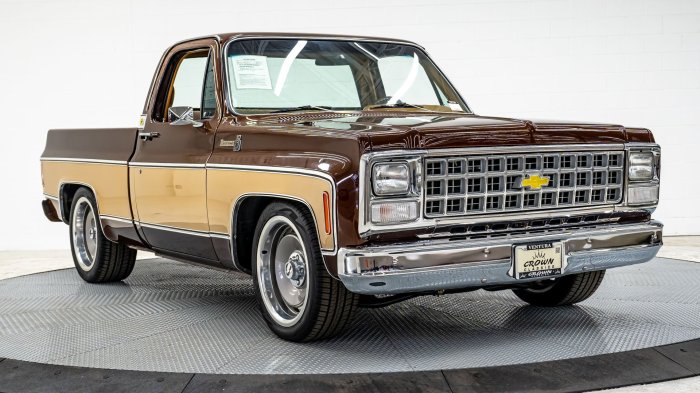
The 1980 Chevrolet Tow Truck, a stalwart of the automotive industry, was a reliable and robust vehicle designed to handle demanding towing tasks. Built upon the foundation of Chevrolet’s renowned C/K platform, this tow truck offered a blend of power, durability, and versatility, making it a popular choice for both professional tow operators and private individuals.
Model Variations and Features
The 1980 Chevrolet Tow Truck was available in various configurations, catering to diverse towing needs. The most common models included the C10, C20, and C30, each offering varying payload capacities and drivetrain options.
- The C10, the lightest of the three, was often favored for smaller towing jobs, while the C20 and C30, with their increased gross vehicle weight ratings (GVWR), were better suited for heavier loads and larger vehicles.
- Each model could be equipped with a range of features, including a variety of bed lengths, wheelbases, and optional equipment like winches, wrecker bodies, and specialized towing attachments.
Engine Options and Drivetrain Configurations
The 1980 Chevrolet Tow Truck was powered by a selection of robust gasoline and diesel engines.
- The gasoline engine options included the 350 cubic inch (5.7L) small-block V8, which produced a respectable amount of power for towing, and the larger 400 cubic inch (6.6L) V8, known for its torque and pulling strength.
- For those seeking even greater hauling capacity and fuel efficiency, diesel engine options were also available, such as the 350 cubic inch (5.7L) diesel V8, known for its durability and low operating costs.
These engines were mated to either a three-speed automatic or a four-speed manual transmission, with a variety of rear axle ratios available to optimize towing performance and fuel economy based on the intended application.
Towing Capacity and Capabilities
The towing capacity of the 1980 Chevrolet Tow Truck varied significantly depending on the specific model, engine, and drivetrain configuration.
- The C10 models, with their lighter GVWR, typically had a towing capacity in the range of 8,000 to 10,000 pounds.
- The heavier-duty C20 and C30 models, equipped with the larger engines and more robust drivetrains, could tow up to 15,000 pounds or more, depending on the specific configuration.
The truck’s robust chassis, heavy-duty suspension, and powerful brakes were designed to handle the stresses of towing heavy loads, ensuring safe and reliable operation even under demanding conditions.
The 1980 Chevrolet Tow Truck, a stalwart of roadside assistance, was a far cry from the sleek elegance of its predecessor, the 1960 Chevrolet Impala. While the Impala was known for its chrome and fins, the Tow Truck was built for durability and strength, a workhorse designed to handle any situation.
Both vehicles, however, represented the spirit of American automotive ingenuity, each in their own distinct way.
Historical Context and Significance
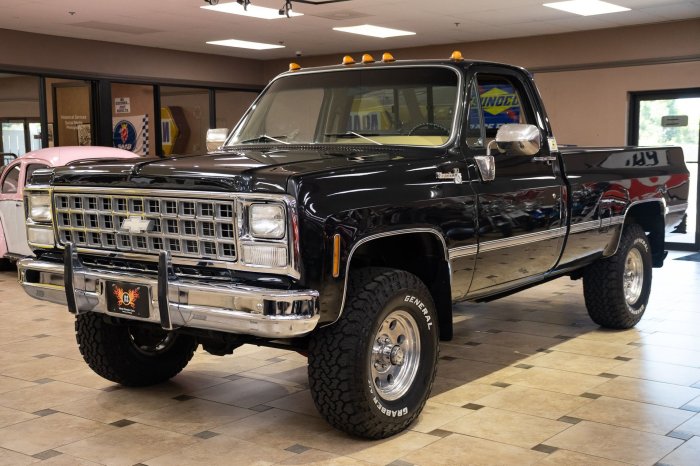
The 1980s saw a significant evolution in the towing industry, with tow trucks becoming increasingly sophisticated and specialized. The 1980 Chevrolet Tow Truck played a pivotal role in this transformation, contributing to the industry’s growth and efficiency.Tow trucks were an essential part of the automotive industry in the 1980s, providing vital services such as roadside assistance, vehicle recovery, and transportation.
The demand for towing services grew alongside the increasing number of vehicles on the road.
Design Trends and Technological Advancements
Tow truck design and technology advanced significantly in the 1980s. Manufacturers focused on improving safety, efficiency, and versatility. Key advancements included:
- Hydraulic Systems:Hydraulic systems became increasingly common, replacing manual winches and providing greater lifting capacity and control. This allowed for the safe and efficient towing of heavier vehicles.
- Improved Cab Design:Tow truck cabs became more spacious and comfortable, providing better ergonomics and visibility for drivers.
- Enhanced Safety Features:Safety features such as roll cages, improved braking systems, and warning lights became standard equipment, enhancing driver and roadside safety.
- Specialized Towing Equipment:Tow trucks were equipped with specialized equipment for different types of vehicles, such as flatbeds for transporting cars and wreckers for heavy-duty towing.
Impact of the 1980 Chevrolet Tow Truck
The 1980 Chevrolet Tow Truck was a popular and reliable choice for towing companies in the 1980s. Its robust construction, powerful engine, and versatility made it well-suited for a wide range of towing applications. It contributed to the industry’s growth by:
- Increased Efficiency:Its hydraulic systems and advanced design improved towing efficiency, allowing operators to complete tasks more quickly and effectively.
- Enhanced Safety:Its safety features provided a safer working environment for drivers and reduced the risk of accidents.
- Improved Customer Service:The 1980 Chevrolet Tow Truck’s reliability and versatility allowed towing companies to provide better service to their customers.
Comparison to Other Tow Trucks of the Era
The 1980 Chevrolet Tow Truck was a strong competitor in the market, offering a balance of performance, reliability, and affordability. It was comparable to other popular tow trucks of the era, such as the Ford F-Series and the International Harvester S-Series.
“The 1980 Chevrolet Tow Truck was known for its durability and ease of maintenance, making it a popular choice among towing companies.”
[Source
Industry Expert]
Design and Engineering: 1980 Chevrolet Tow Truck
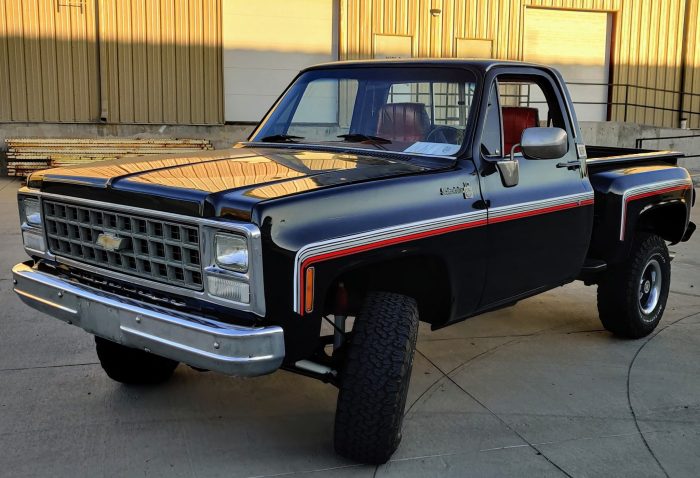
The 1980 Chevrolet Tow Truck was a robust and reliable vehicle designed for demanding towing operations. It combined a durable chassis with a specialized body and cab to handle heavy loads and provide a comfortable workspace for the operator.
Chassis and Body
The 1980 Chevrolet Tow Truck was typically built on a heavy-duty Chevrolet chassis, often the C-series or K-series, known for their strength and durability. The chassis was equipped with a powerful engine, typically a gasoline V8 or a diesel engine, and a heavy-duty transmission designed to handle the torque and weight of towing operations.
The truck’s body was custom-built, usually by specialized manufacturers, to accommodate the towing equipment and provide a spacious and functional workspace for the operator. The body was typically made of steel, with a flatbed design that allowed for easy loading and unloading of towed vehicles.
Towing System
The towing system of the 1980 Chevrolet Tow Truck was the heart of its operation. It typically consisted of a powerful winch, a hydraulic boom, and tow hooks. The winch, mounted on the front of the truck, was used to pull vehicles onto the flatbed.
The hydraulic boom, mounted on the rear of the truck, was used to lift and maneuver towed vehicles. The boom was typically equipped with a variety of attachments, such as chains, straps, and hooks, to accommodate different types of vehicles.
The tow hooks, located on the front and rear of the truck, were used to connect to towed vehicles.
Safety Features and Technology
The 1980 Chevrolet Tow Truck was equipped with a variety of safety features to protect the operator and the public. These features included:
- Brakes:The truck had heavy-duty brakes designed to handle the weight of the truck and the towed vehicle.
- Lights:The truck was equipped with a variety of lights, including headlights, taillights, brake lights, and turn signals, to improve visibility.
- Safety Equipment:The truck was also equipped with safety equipment such as a fire extinguisher, first-aid kit, and warning triangles.
Overall Engineering and Construction, 1980 Chevrolet Tow Truck
The 1980 Chevrolet Tow Truck was a well-engineered and robust vehicle designed to handle the demands of towing operations. Its heavy-duty chassis, powerful engine, and specialized body made it capable of towing a wide range of vehicles. The truck’s towing system was designed for efficiency and safety, and its safety features helped to protect the operator and the public.
Performance and Handling
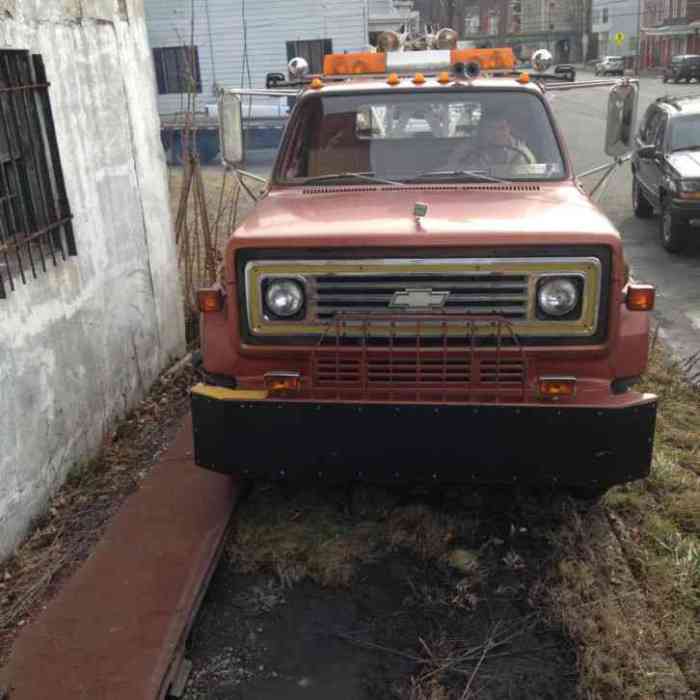
The 1980 Chevrolet Tow Truck, while built for strength and durability, was not designed for speed or agility. Its primary function was towing, and its performance reflected that focus.
The 1980 Chevrolet Tow Truck, a workhorse of the roads, represents a stark contrast to its earlier counterparts. While the 1980 model boasted modern features and powerful engines, earlier Chevrolets like the 1916 Chevrolet Touring offered a glimpse into a bygone era of elegance and simplicity.
The 1916 Touring, with its wooden frame and open-air design, was a testament to the craftsmanship of its time. However, the 1980 Tow Truck’s robust build and dependable performance made it a mainstay in the towing industry, highlighting the evolution of Chevrolet’s vehicles over the decades.
Performance
The 1980 Chevrolet Tow Truck was typically powered by a robust gasoline engine, often a V8, providing ample torque for towing heavy loads. However, this came at the cost of fuel efficiency. While exact figures vary depending on the specific engine and transmission combination, these trucks were not known for their fuel economy.
Handling and Maneuverability
The 1980 Chevrolet Tow Truck was designed for stability and handling, especially when towing heavy loads. The truck’s long wheelbase and sturdy suspension provided a stable platform, even when dealing with significant weight. However, the truck’s size and weight made it less maneuverable in tight spaces.
Braking System
The 1980 Chevrolet Tow Truck featured a hydraulic braking system with large disc brakes or drum brakes, depending on the model. These brakes were designed to handle the increased weight and stopping force required when towing heavy loads.
Overall Driving Experience
Driving the 1980 Chevrolet Tow Truck was a robust and purposeful experience. The truck’s large size and heavy weight gave it a commanding presence on the road. The powerful engine provided ample torque for towing, while the sturdy suspension ensured a smooth ride, even on rough roads.
The 1980 Chevrolet Tow Truck, a rugged workhorse known for its reliability, was a common sight on American roads. While its primary purpose was to rescue stranded vehicles, it shared a lineage with other iconic Chevrolet models like the 1971 Chevrolet Monte Carlo , a stylish coupe that embodied the spirit of the era.
The 1980 Tow Truck, however, was built for practicality, boasting a powerful engine and a sturdy frame capable of handling heavy loads, making it a true workhorse of the American automotive landscape.
However, the truck’s lack of speed and agility made it less suited for highway driving or maneuvering in tight spaces.
Maintenance and Repair
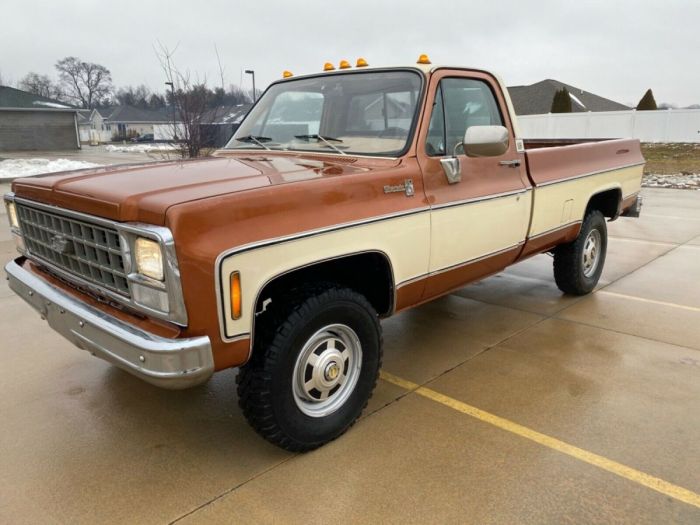
The 1980 Chevrolet Tow Truck, like any other vehicle, requires regular maintenance to ensure its longevity and optimal performance. This section will delve into common maintenance procedures, typical wear and tear issues, available parts and resources, and recommended tools and equipment for maintaining your 1980 Chevrolet Tow Truck.
Common Maintenance Procedures
Regular maintenance is crucial for extending the life of your 1980 Chevrolet Tow Truck. Here are some essential procedures:
- Oil Change:Change the engine oil every 3,000 miles or as recommended by the manufacturer. Using the correct oil type and viscosity is vital for engine lubrication and performance.
- Air Filter:Replace the air filter every 12,000 miles or as needed, depending on driving conditions. A clean air filter ensures proper air intake and optimal engine performance.
- Fuel Filter:Replace the fuel filter every 12,000 miles or as needed, depending on fuel quality. A clean fuel filter prevents dirt and debris from entering the engine.
- Spark Plugs:Replace spark plugs every 30,000 miles or as recommended by the manufacturer. Worn spark plugs can lead to poor engine performance and fuel economy.
- Brake Inspection:Inspect brake pads, rotors, and calipers regularly. Replace worn brake pads and rotors to maintain braking efficiency and safety.
- Tire Pressure:Maintain proper tire pressure according to the manufacturer’s specifications. Under-inflated tires can lead to premature wear and tear.
- Fluid Levels:Regularly check and replenish fluid levels for engine coolant, power steering fluid, brake fluid, and transmission fluid.
Typical Wear and Tear Issues
Over time, certain components in your 1980 Chevrolet Tow Truck are prone to wear and tear. Here are some common issues:
- Engine:Engine wear and tear can manifest as decreased performance, oil leaks, and increased fuel consumption.
- Transmission:Transmission problems can include slipping gears, rough shifting, and transmission fluid leaks.
- Suspension:Worn suspension components can lead to poor handling, excessive noise, and a bouncy ride.
- Steering:Steering issues can include loose steering, steering wheel vibration, and difficulty turning.
- Brakes:Brake problems can include squeaking, grinding, or spongy brakes.
Parts and Resources
Fortunately, obtaining parts and resources for maintaining your 1980 Chevrolet Tow Truck is relatively straightforward.
- Original Equipment Manufacturer (OEM) Parts:Chevrolet dealerships and authorized parts suppliers offer genuine OEM parts, ensuring compatibility and quality.
- Aftermarket Parts:Numerous aftermarket parts suppliers offer alternative options, often at more affordable prices. Be sure to research and select reputable suppliers.
- Online Resources:Websites like eBay, Amazon, and specialized automotive parts retailers offer a wide selection of parts for your 1980 Chevrolet Tow Truck.
- Repair Manuals:Obtain a repair manual for your specific model year and engine. These manuals provide detailed instructions and specifications for repairs and maintenance.
Recommended Tools and Equipment
Having the right tools and equipment makes maintenance and repair tasks easier and more efficient. Here’s a list of recommended items:
- Basic Hand Tools:Wrench set, socket set, screwdriver set, pliers, hammer, and a torque wrench.
- Jack and Stands:Essential for lifting the vehicle safely during repairs.
- Tire Iron and Lug Wrench:Used for changing tires and tightening lug nuts.
- Fluid Extractor:A tool for safely removing fluids from the engine, transmission, and other systems.
- Diagnostic Scanner:A tool for reading and interpreting engine codes, aiding in troubleshooting.
- Safety Glasses and Gloves:Important for protecting your eyes and hands during repairs.
Cultural Impact and Legacy
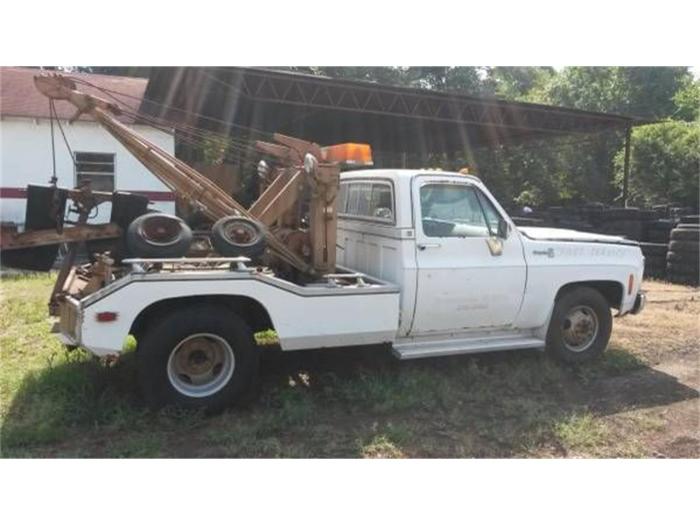
The 1980 Chevrolet Tow Truck, while not a flashy sports car or a luxury sedan, holds a unique place in American culture. It represents the unsung heroes of the road, the dependable workhorses that come to our rescue when we’re stranded or in need.
Representation in Popular Media
The 1980 Chevrolet Tow Truck has appeared in countless movies, TV shows, and video games, often playing a supporting role but always leaving a lasting impression. Its iconic design, with its distinctive red and yellow livery, has become synonymous with roadside assistance.
In the 1980s, the truck was frequently featured in action films, such as “The Blues Brothers” (1980) and “Smokey and the Bandit” (1977), where it was used for high-speed chases and daring rescues.
Impact on People’s Lives
Beyond its cinematic presence, the 1980 Chevrolet Tow Truck has touched the lives of countless individuals. For many, it represents a moment of relief and gratitude, a symbol of hope when faced with unexpected car trouble. It’s the friendly face of the tow truck driver, who often goes above and beyond to help stranded motorists, that makes the experience memorable.
Stories abound of tow truck drivers assisting with unexpected emergencies, providing comfort and support during difficult times.
Influence on Modern Tow Trucks
The 1980 Chevrolet Tow Truck’s legacy lives on in the design and development of modern tow trucks. The truck’s robust construction, powerful engine, and reliable towing capacity set the standard for the industry. Its features, such as the hydraulic winch and the flatbed design, have been adopted and refined in modern tow trucks.
The truck’s emphasis on safety and functionality has been instrumental in shaping the industry’s focus on these aspects.
Timeline of the Chevrolet Tow Truck
- 1918:Chevrolet introduces its first commercial truck, marking the beginning of the company’s foray into the heavy-duty vehicle market.
- 1930s:Chevrolet begins producing dedicated tow trucks, incorporating features like winches and flatbeds, catering to the growing demand for roadside assistance.
- 1950s:Chevrolet introduces the “C-Series” trucks, known for their durability and power, which became popular choices for tow truck operators.
- 1970s:Chevrolet refines its tow truck offerings, incorporating modern design elements and safety features, resulting in the iconic 1980 Chevrolet Tow Truck.
- 1980s:The 1980 Chevrolet Tow Truck becomes a cultural icon, appearing in popular media and serving as a symbol of roadside assistance.
- 1990s-Present:Chevrolet continues to evolve its tow truck offerings, incorporating advanced technologies and safety features, while maintaining the legacy of reliability and performance established by the 1980 model.
Collector’s Value and Market Trends
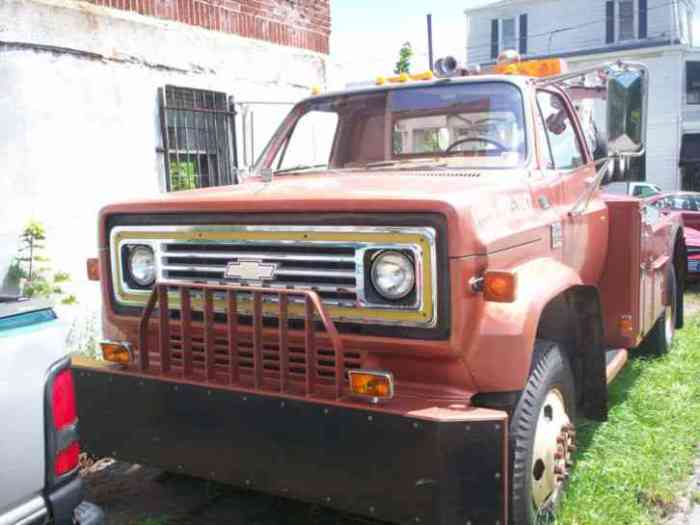
The 1980 Chevrolet Tow Truck, a robust and reliable workhorse of its era, is steadily gaining traction in the collector’s market. Its unique combination of historical significance, rugged design, and potential for restoration makes it a desirable acquisition for enthusiasts.
Current Market Value and Influencing Factors
The market value of a 1980 Chevrolet Tow Truck is influenced by several factors, including its condition, originality, and modifications. A well-preserved, original example in excellent condition can fetch a premium price, while those requiring restoration or with significant modifications may command a lower value.
- Condition:A pristine, unrestored 1980 Chevrolet Tow Truck in original condition will command the highest value. The presence of original paint, interior, and mechanical components significantly enhances its desirability.
- Modifications:While some modifications, such as upgraded brakes or suspension, can increase functionality, they often detract from the vehicle’s originality and thus its market value.
- Documentation:Original owner’s manuals, service records, and other documentation add authenticity and historical value to a 1980 Chevrolet Tow Truck.
- Rarity:Specific models or configurations, particularly those produced in limited numbers, can command a higher price due to their scarcity.
Collector’s Market for Classic Tow Trucks
The collector’s market for classic tow trucks is experiencing a resurgence of interest, driven by nostalgia, a growing appreciation for automotive history, and the unique character of these vehicles.
- Nostalgia:For many collectors, classic tow trucks evoke fond memories of childhood, road trips, or a bygone era of automotive craftsmanship.
- Historical Significance:Classic tow trucks played a vital role in the development of the automotive industry and the evolution of roadside assistance. Their historical significance makes them desirable for museums and private collections.
- Uniqueness:Unlike typical passenger cars, classic tow trucks possess a distinctive character, often featuring heavy-duty construction, specialized equipment, and a rugged aesthetic.
Demand and Availability Trends
The demand for 1980 Chevrolet Tow Trucks is steadily increasing, particularly among collectors and enthusiasts seeking a unique and functional piece of automotive history. However, finding a well-preserved example can be challenging, as many trucks from this era have been used extensively and may have undergone significant modifications or repairs.
- Increasing Demand:As the popularity of classic tow trucks grows, the demand for well-preserved examples, especially those in original condition, is expected to continue rising.
- Limited Availability:The number of surviving 1980 Chevrolet Tow Trucks in good condition is limited, making it a challenge to find a desirable example.
- Restoration Projects:Many collectors seek out 1980 Chevrolet Tow Trucks as restoration projects, offering an opportunity to return these vehicles to their former glory.
Estimated Market Values
The estimated market value of a 1980 Chevrolet Tow Truck can vary significantly depending on its condition, modifications, and location.
| Model | Condition | Estimated Market Value |
|---|---|---|
| 1980 Chevrolet C30 Tow Truck (Original Condition) | Excellent | $15,000
|
| 1980 Chevrolet C30 Tow Truck (Restored) | Excellent | $20,000
|
| 1980 Chevrolet C30 Tow Truck (Modified) | Good | $10,000
|
Ultimate Conclusion
The 1980 Chevrolet Tow Truck, a symbol of American ingenuity and reliability, continues to hold a special place in the hearts of car enthusiasts and collectors. Its rugged design, powerful engine, and unwavering dependability made it a mainstay on roads across the country, and its legacy continues to inspire awe and admiration.
Whether you’re a seasoned mechanic, a vintage car aficionado, or simply someone who appreciates a well-crafted piece of machinery, the 1980 Chevrolet Tow Truck is a testament to the enduring power of American automotive engineering.